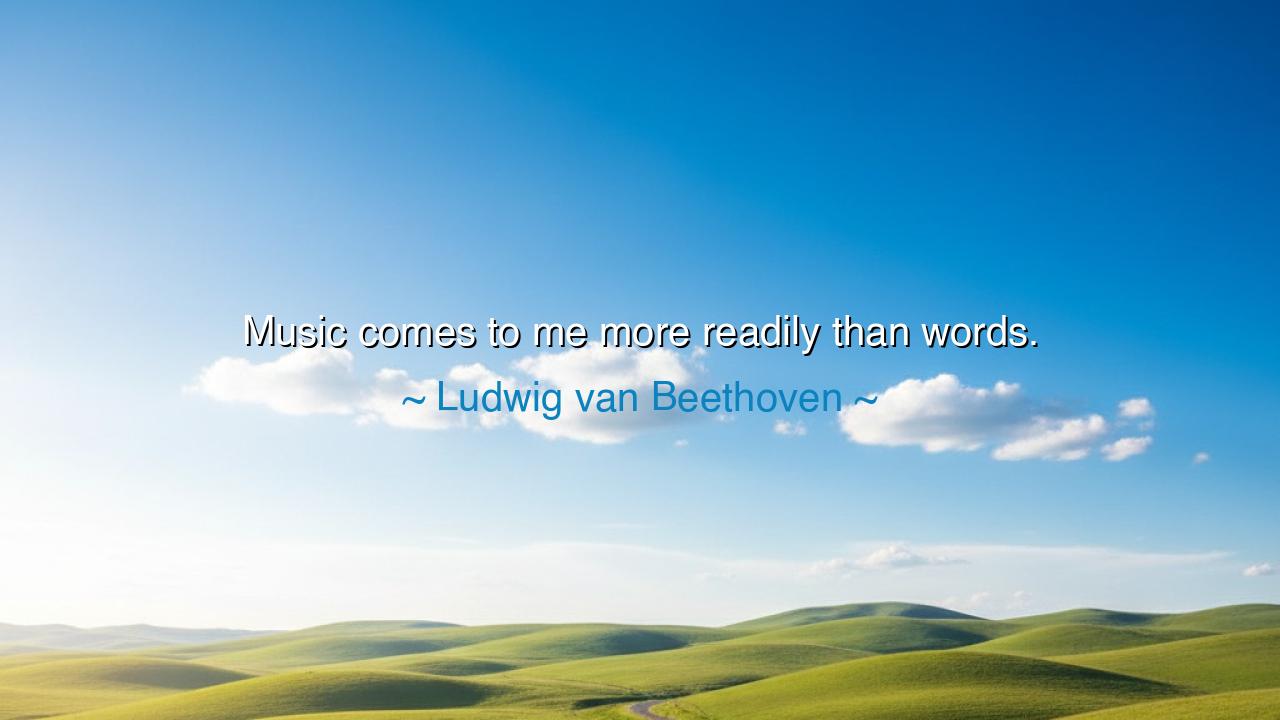
Music comes to me more readily than words.






When Ludwig van Beethoven declared, “Music comes to me more readily than words,” he revealed the essence of his soul and the origin of his genius. These words are not mere observation, but a confession of how his spirit communed with the world. For some, language is the natural vessel of expression, but for Beethoven, it was sound—the rising of notes, the clash of harmonies, the whisper of melody—that carried truth more powerfully than any human tongue could shape.
The ancients would have understood this well. Before written speech, there was the drumbeat around the fire, the chant of the priest, the lullaby of the mother. Music spoke directly to the heart when words were still clumsy and unformed. It is older than language, older than alphabet, older even than memory itself. Beethoven, standing as one of the greatest heralds of this eternal art, merely put into speech what humanity has known in silence: that sound can carry what speech cannot.
Consider Beethoven’s own life. He was struck by the cruel fate of deafness, losing the very sense through which the world thought music must be born. Yet even as silence encircled him, melodies still flowed within his mind, pure and unbroken. The Ninth Symphony, with its Ode to Joy, was composed when he could hear nothing with his ears, but everything with his soul. If music came to him “more readily than words,” it was because words are bound to hearing and grammar, but music is bound to the eternal pulse of the universe.
There are echoes of this in the stories of prophets and poets. The psalmist David, before he was king, soothed the madness of Saul not with speeches but with the strings of his harp. Where words failed to calm, music brought peace. So too with Beethoven: he spoke not as a politician or philosopher, but as one who let notes speak where the tongue faltered. In this way, his symphonies became sermons, his sonatas became confessions, his quartets became dialogues with eternity.
This truth carries a lesson for all who listen: not all souls are meant to speak with words alone. Some express themselves in art, some in silence, some in deeds of service. The mistake of the world is to demand that every truth be put into sentences. Yet the deepest longings of the heart cannot always be spoken; they must be painted, sung, carved, or lived. Beethoven’s words remind us that expression is not bound to one form. Seek the medium through which your spirit flows most freely, and honor it.
Practically, this means listening to the language of your own gifts. Do not force yourself to speak where your strength is in painting. Do not despair if you stumble in speech, for perhaps your truth is meant for music, for movement, for craft. Create the space in your life where that flow can emerge—whether in sound, in writing, in building, or in love freely given. What matters is not that you use words, but that you speak your soul’s language.
Thus, Beethoven’s confession is both personal and universal. For him, music was the river that carried his spirit, more faithful than words, more enduring than speech. And for us, it is a call to discover the river that runs through our own lives. If we follow it, we too may find a way to speak the unspeakable, to voice the eternal, and to leave behind a song that echoes across generations.






AAdministratorAdministrator
Welcome, honored guests. Please leave a comment, we will respond soon